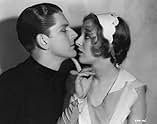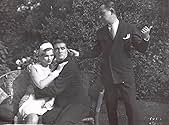A Eugenics expert convinces his sister and her husband, a barren couple, to adopt the offspring of his carefully selected "thoroughbreds": the family's chauffeur and maid who themselves are ... Read allA Eugenics expert convinces his sister and her husband, a barren couple, to adopt the offspring of his carefully selected "thoroughbreds": the family's chauffeur and maid who themselves are engaged.A Eugenics expert convinces his sister and her husband, a barren couple, to adopt the offspring of his carefully selected "thoroughbreds": the family's chauffeur and maid who themselves are engaged.
Featured reviews
Wealthy writer Frank Craven (as Alan Camp) is a believer in eugenics (defined by the Oxford Dictionary as "the science of improving a human population by controlled breeding to increase the occurrence of desirable heritable characteristics. Developed largely by Francis Galton as a method of improving the human race, it fell into disfavor only after the perversion of its doctrines by the Nazis"). After publishing a book on the topic, Mr. Craven wants to help his sister and her husband have a baby. The couple has been trying to start a family for years, with no luck. Craven believes his driver Hugh Trevor (as Joe Garvin) is a perfect male specimen. He is engaged to very beautiful maid Sally Blane (as Nora Tracy). The exceptionally attractive couple have not yet married because Ms. Blane wants to be a supported housewife...
Craven approaches Mr. Trevor with his proposal. For $15,000, the handsome chauffeur is to impregnate the pretty maid. Then, he must give the baby to Craven's brother-in-law Allen Kearns and his wife Doris Eaton (as Gilbert and Edith Goodhue). The latter couple will go to California for a year, then return for their child. Trevor and Blane jump at the deal. One year later, the cast reassembles. Naturally, things do not go according to plan. There is a very long set-up to the comic highlight, but the last act is very funny. "The Very Idea" is a fine (and inoffensive) adaptation of William LeBaron's stage play, brought to the screen by Mr. LeBaron with actor/directors Richard Rosson and Craven managing the players. Longing to hear "the patter of little feet," Broadway stage actor Kearns is particularly memorable.
****** The Very Idea (9/15/29) Frank Craven, Richard Rosson ~ Frank Craven, Allen Kearns, Hugh Trevor, Sally Blane
Craven approaches Mr. Trevor with his proposal. For $15,000, the handsome chauffeur is to impregnate the pretty maid. Then, he must give the baby to Craven's brother-in-law Allen Kearns and his wife Doris Eaton (as Gilbert and Edith Goodhue). The latter couple will go to California for a year, then return for their child. Trevor and Blane jump at the deal. One year later, the cast reassembles. Naturally, things do not go according to plan. There is a very long set-up to the comic highlight, but the last act is very funny. "The Very Idea" is a fine (and inoffensive) adaptation of William LeBaron's stage play, brought to the screen by Mr. LeBaron with actor/directors Richard Rosson and Craven managing the players. Longing to hear "the patter of little feet," Broadway stage actor Kearns is particularly memorable.
****** The Very Idea (9/15/29) Frank Craven, Richard Rosson ~ Frank Craven, Allen Kearns, Hugh Trevor, Sally Blane
This early talkie is rather static and at times it feels like the actors are playing to a theater audience. "The Very Idea" is adapted from a play.
The story is simple: a couple wants to have a baby and they employ a surrogate mother (and father) to produce a baby for them.
This does not seem very different from the surrogacy that is now very popular in the U.S. But dialogue about improving the human race make this story feel more like it is about eugenics, the social movement that existed during the early 20th century.
I found the story rather insipid and the acting amateurish and stiff, but this film is somewhat interesting just as a representation of film quality in 1929 and because of its intimations of eugenics, which later became tainted due to Nazi associations.
The story is simple: a couple wants to have a baby and they employ a surrogate mother (and father) to produce a baby for them.
This does not seem very different from the surrogacy that is now very popular in the U.S. But dialogue about improving the human race make this story feel more like it is about eugenics, the social movement that existed during the early 20th century.
I found the story rather insipid and the acting amateurish and stiff, but this film is somewhat interesting just as a representation of film quality in 1929 and because of its intimations of eugenics, which later became tainted due to Nazi associations.
Storyline
Did you know
- Trivia(1917). Stage Play: The Very Idea. Written by William LeBaron. Astor Theatre: 9 Aug 1917- Aug 1917 (closing date unknown/15 performances). Cast: Mabel Allan, Richard Bennett, William Probert Carleton, Ruth Collins, Josephine Drake, Dorothy Mackaye, Florence Oakley, Purnell Pratt (as "George Green"), Ernest Truex (as "Gilbert Goodhue"). Produced by Gilbert M. 'Broncho Billy' Anderson and L. Lawrence Weber. Note: Filmed by Radio Pictures as The Very Idea (1929).
Details
- Runtime1 hour 5 minutes
- Color
Contribute to this page
Suggest an edit or add missing content




















